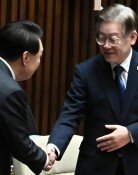Responsive chord needed with the public
Responsive chord needed with the public
Posted August. 07, 2015 07:19,
When announcing the statement to set out the Korean governments future directions for state affairs including reform in four key sectors of labor, public, education and finance on Aug. 6, President Park Geun-hye repeatedly asked for cooperation to the public and stakeholders. The President has emphasized that the reform in four major sectors is desperately needed to revive Koreas faltering economy in the midst of economic challenges in and out of Korea, and the publics active participation is needed to ensure success of the reform. However, it is still doubtful whether her desperate request has struck a chord with the public.
In the first place, the President has never mentioned the MERS outbreak which terrorized the general citizens and froze the domestic economy, not to mention an apology. If the health minister was replaced due to the governments incapability to quarantine the deadly virus in the initial stages, it is an appropriate manner for the President to make an apology and console the disheartened public in Korea. Compared to other nations, Korea is in a worse economic situation, which resulted in high unemployment rate among the youth and economic difficulties of the general public. The President must have expressed regret for the current situation, before making a request to the public.
President Park did not receive any questions from journalists and reporters as she read the statement in a nationally televised speech. The Blue House said Q&A session originally was planned provided that the reporters ask questions only about the reform in key sectors but the plan fell through because reporters did not reach a consensus. Probably, the Blue House was concerned about journalists asking questions on sensitive political issues, which could make the statement less meaningful. But it could become a venue of live communication if the President would address questions well. If President Park and the Blue House wanted reporters to write down what she said, what was the purpose of journalists to attend? President Parks reading a statement with reporters seated showed once again her lack of communication with the public. It is hard to win heart of the public when the President asks others to change while she remains the same.
When it comes to the wage peak system, half of the top 30 big companies has introduced the system through labor-management negotiations. However, only 11 out of 316 state-owned companies introduced the wage peak system. President Park belatedly pledged to introduce the wage peak system to all state-owned companies by the end of this year. When public servants and employees of the state-owned companies can enjoy wages increase according to the seniority without concerns of dismissal based on performance, how can the government ask private businesses to make the labor market more flexible, where hiring and wage are determined according to capability and performance?
President Park said the public sector recorded surplus for the first time in seven years by reducing debts and improving reckless management of state-owned companies. However, the surplus that President Park boasted is meaningless since it was earned by selling real estates and overseas assets owned by public enterprise, rather than through management rationalization. The state-owned companies even provided performance-based bonus in the midst of snowballing debts. As the state-owned companies are ignoring the reality and claiming that they produced great performance, which is not true, it is doubtful whether the public enterprises are aware of the reality.
If the government wants to push ahead with reform in the private sector, the government or the public sector must take the initiative and lead by examples. Before announcing a reform plan of the labor market, the British administration under Prime Minister David Cameron pledged to cut 40% of the welfare budget which amounted to 2.1 trillion won and the budgets of individual ministry, decrease the number of public servants by 100,000, and freeze wage increase rate of public officials within an annual range of 1% for the next five years. Brazilian government vowed to cut the government organization into half. But in Korea, where the golden parachute practice is still intact to fill top positions of public organizations with retired government officials, it is highly questionable whether it is possible to pursue reform in the public sector.
The opposition party must be blamed for not passing bills at the Assembly including the Basic Act on Service Industry Development which can help the domestic economy revive. But the President needs to roll up her sleeves and make efforts to persuade the opposition party. If President Park makes such sincere efforts to persuade, it will move the public and finally the opposition party.
The governments capability in state affairs and politics is how to provide a vision to the public and realize it. In order for President Park to implement the reform in four key sectors, the President needs to show sincerity to the public through self-sacrifice, self-reflection and leading by examples. President Park also must show true leadership to elicit consensus and voluntary cooperation from the public through active communication.
Headline News
- Med professors announce intention to leave hospitals starting Thursday
- Bridge honoring Sgt. Moon Jae-sik unveiled in Pennsylvania
- Chief of Staff Chung tells presidential secretaries to stay away from politics
- US FTC bans noncompete agreements
- N. Korea launches cyberattacks on S. Korea's defense companies







